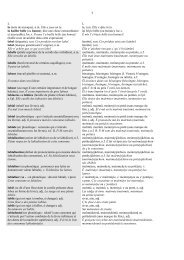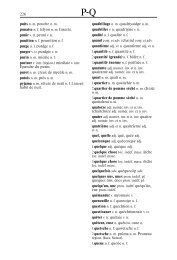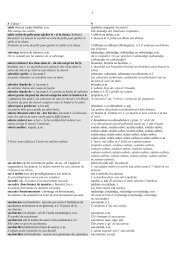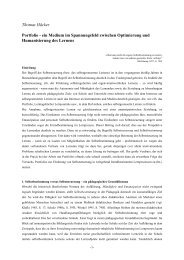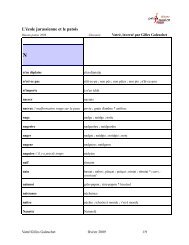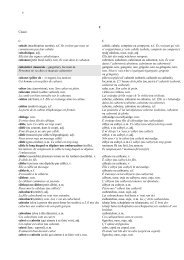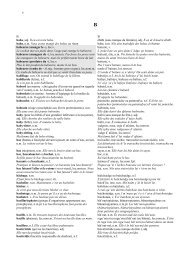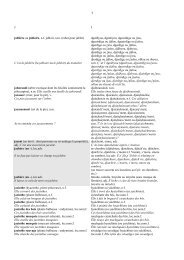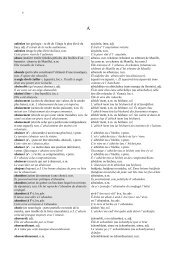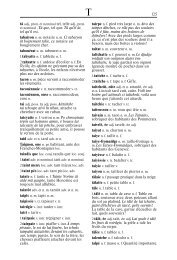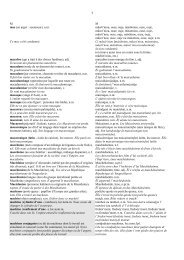apporteur (qui rend compte), adj. <strong>ra</strong>ippoétchou, ouse, ouje, ou <strong>ra</strong>ippotchou, ouse, ouje, adj. Le juge <strong>ra</strong>pporteur s’approche. L’ <strong>ra</strong>ippoétchou (ou <strong>ra</strong>ippotchou) djudge s’ aippreutche. <strong>ra</strong>pporteur (celui qui rend compte), n.m. <strong>ra</strong>ippoétchou, ouse, ouje, ou <strong>ra</strong>ippotchou, ouse, ouje, n.m. Il faut désigner un <strong>ra</strong>pporteur. È fât dénanmaie ïn <strong>ra</strong>ippoétchou (ou <strong>ra</strong>ippotchou). <strong>ra</strong>pporteur (instrument <strong>de</strong> géométrie), n.m. <strong>ra</strong>ippoétchou ou <strong>ra</strong>ippotchou, n.m. Elle utilise un <strong>ra</strong>pporteur. Èlle se sie d’ ïn <strong>ra</strong>ippoétchou (ou <strong>ra</strong>ippotchou). <strong>ra</strong>pporteur (mauvais -, qui répéte faussement), mâdéchaint, ainne, madéchaint, ainne, mâdéjaint, ainne, loc.nom.m. madéjaint, ainne, mâdiéchaint, ainne, madiéchaint, ainne, Tu n’as sûrement pas cru ce mauvais <strong>ra</strong>pporteur. mâdiéjaint, ainne ou madiéjaint, ainne, n.m. Tochu que t’ n’ és p’ c<strong>ra</strong>yu ci mâdéchaint (madéchaint, mâdéjaint, madéjaint, mâdiéchaint, madiéchaint, mâdiéjaint ou madiéjaint). <strong>ra</strong>pport (par -), loc.prép. pai<strong>ra</strong>imé, pai<strong>ra</strong>imô, pai<strong>ra</strong>imo, pai<strong>ra</strong>imôé, pai<strong>ra</strong>imoé, pai<strong>ra</strong>imoins, pai<strong>ra</strong>mé, pai<strong>ra</strong>mô, pai<strong>ra</strong>mo, pai<strong>ra</strong>môé, pai<strong>ra</strong>moé, pai<strong>ra</strong>moins ou La terre est petite par <strong>ra</strong>pport au soleil. pa<strong>ra</strong>moins, prép. Lai tiere ât p’téte pai<strong>ra</strong>imé (pai<strong>ra</strong>imô, pai<strong>ra</strong>imo, pai<strong>ra</strong>imôé, pai<strong>ra</strong>imoé, pai<strong>ra</strong>imoins, pai<strong>ra</strong>mé, pai<strong>ra</strong>mô, pai<strong>ra</strong>mo, pai<strong>ra</strong>môé, pai<strong>ra</strong>moé, pai<strong>ra</strong>moins ou pa<strong>ra</strong>moins) â s’<strong>ra</strong>ye. (on trouve aussi toutes ces prépositions sous la forme: pè<strong>ra</strong>imé, etc.) <strong>ra</strong>pport (par -), loc.prép. pair (ou pèr) aimé (aimô, aimo, aimôé ou aimoé), loc.prép. Votre jardin est g<strong>ra</strong>nd par <strong>ra</strong>pport au nôtre. Vote tieutchi ât grôs pair (ou pèr) aimé (aimô, aimo, aimôé ou aimoé) â nôte. <strong>ra</strong>quer (être cont<strong>ra</strong>int <strong>de</strong> payer), v. <strong>ra</strong>iquaie, <strong>ra</strong>itçhaie, <strong>ra</strong>ityaie, <strong>ra</strong>quaie, <strong>ra</strong>tçhaie ou <strong>ra</strong>tyaie, v. Il a bien dû <strong>ra</strong>quer. Èl é bïn daivu <strong>ra</strong>iquaie (<strong>ra</strong>itçhaie, <strong>ra</strong>ityaie, <strong>ra</strong>quaie, <strong>ra</strong>tçhaie ou <strong>ra</strong>tyaie). <strong>ra</strong>quette (instrument permettant <strong>de</strong> lancer une balle, <strong>ra</strong>iquatte, <strong>ra</strong>itçhatte ou <strong>ra</strong>ityatte, n.f. un volant), n.f. Il a acheté une <strong>ra</strong>quette neuve. Èl é aitch’tè ènne neûve <strong>ra</strong>iquatte (<strong>ra</strong>itçhatte ou <strong>ra</strong>ityatte). <strong>ra</strong>quette (semelle fixée aux chaussures pour marcher <strong>ra</strong>iquatte, <strong>ra</strong>itçhatte ou <strong>ra</strong>ityatte, n.f. dans la neige), n.f. Elle chausse ses <strong>ra</strong>quettes. Èlle tchâsse ses <strong>ra</strong>iquattes (<strong>ra</strong>itçhattes ou <strong>ra</strong>ityattes). <strong>ra</strong>quette (oponce, cactus), n.f. Cette <strong>ra</strong>quette a <strong>de</strong> pitçha, pitçhat, pitia, pitiat, pitya ou pityat, n.m. Ci pitçha belles fleurs jaunes. (pitçhat, pitia, pitiat, pitya ou pityat) é d’ bèlles djânes çhioés <strong>ra</strong>quetteur (personne qui se déplace en <strong>ra</strong>quettes), <strong>ra</strong>iquattou, ouse, ouje, <strong>ra</strong>itçhattou, ouse, ouje ou <strong>ra</strong>ityattou, ouse, n.m. Deux <strong>ra</strong>quetteurs ont passé. ouje, n.m. Dous <strong>ra</strong>iquattous (<strong>ra</strong>itçhattous ou <strong>ra</strong>ityattous) sont péssè. <strong>ra</strong>réfier (se - ; <strong>de</strong>venir plus <strong>ra</strong>re), n.m. s’ éçhairi, s’ éçhairie, s’ éçhéri ou s’ éçhérie, v.pron. L’air se <strong>ra</strong>réfie. L’ oûere s’ éçhairât (éçhaire, éçhérât ou éçhére). <strong>ra</strong>res (découvreur d’objets; dénicheur), loc.nom.m. décreuvou, ouse, ouje, dénitchou, ouse, ouje, détçhevrou, ouse, ouje, détçh’vou, ouse, ouje, détçhvou, ouse, ouje ou détieuvrou, ouse, ouje, n.m. Le découvreur d’objets <strong>ra</strong>res a eu fin nez. L’ décreuvou (dénitchou, détçhevrou, détçh’vou, détçhvou ou détieuvrou) é t’ aivu ïn fïn nèz. <strong>ra</strong>reté (curiosité), n.f. Elle a trouvé une <strong>ra</strong>reté. tiuriojitè, tiuriositè, tyuriojitè ou tyuriositè, n.f. Èlle é trovè ènne tiuriojitè (tiuriositè, tyuriojitè ou tyuriositè). <strong>ra</strong>s (<strong>de</strong> très près), adv. <strong>ra</strong>îs ou <strong>ra</strong>is, adv. Ses ongles sont <strong>coup</strong>és <strong>ra</strong>s. Ses onyes sont copès <strong>ra</strong>îs (ou <strong>ra</strong>is). <strong>ra</strong>s (chef éthiopien), n.m. <strong>ra</strong>îs ou <strong>ra</strong>is, n.m. Il a eu l’occasion <strong>de</strong> rencontrer un <strong>ra</strong>s. Èl é t’ aivu l’ échcâje <strong>de</strong> rencont<strong>ra</strong>ie ïn <strong>ra</strong>îs (ou <strong>ra</strong>is). <strong>ra</strong>s, n.m. ou <strong>ra</strong>s <strong>de</strong> carène, loc.nom.m. (<strong>ra</strong><strong>de</strong>au <strong>ra</strong>îs ou <strong>ra</strong>is, n.m. servant à la répa<strong>ra</strong>tion d’un bâtiment) Le <strong>ra</strong>s (ou <strong>ra</strong>s <strong>de</strong> carène) s’approche <strong>du</strong> g<strong>ra</strong>nd bateau. L’ <strong>ra</strong>îs (ou <strong>ra</strong>is) s’ aippretche d’ lai grôsse nèe. <strong>ra</strong>s ou <strong>ra</strong>z (cou<strong>ra</strong>nt marin violent qui se fait sentir <strong>ra</strong>îs, <strong>ra</strong>is, <strong>ra</strong>îz ou <strong>ra</strong>iz, n.m. dans un passage étroit), n.m. Le <strong>ra</strong>s (ou <strong>ra</strong>z) <strong>de</strong> Sein est impressionnant. L’ <strong>ra</strong>îs (<strong>ra</strong>is, <strong>ra</strong>îz ou <strong>ra</strong>iz) d’ Sein ât ïmprèchionnaint. <strong>ra</strong>s (à - ou au - <strong>de</strong>), loc.prép. en lai <strong>ra</strong>îçhatte (<strong>ra</strong>içhatte, <strong>ra</strong>îciatte, <strong>ra</strong>iciatte, <strong>ra</strong>îcyatte, <strong>ra</strong>icyatte, <strong>ra</strong>îjatte, <strong>ra</strong>ijatte, <strong>ra</strong>îje, <strong>ra</strong>ije, <strong>ra</strong>îs, <strong>ra</strong>is, <strong>ra</strong>îsatte, <strong>ra</strong>isatte, <strong>ra</strong>îse, <strong>ra</strong>ise, réchatte, réçhatte, rèchatte, rèçhatte, réciatte, rèciatte, récyatte, rècyatte, réffe, rèffe, réjatte, rèjatte, réje, rèje, résatte, rèsatte, rèse, rése, riçhatte, riçhiatte (J. Vienat) ou rivatte), Les hiron<strong>de</strong>lles volent à <strong>ra</strong>s (ou au <strong>ra</strong>s) <strong>de</strong>s champs. loc.prép. Les hèlomb<strong>ra</strong>ttes voulant en lai <strong>ra</strong>îçhatte (<strong>ra</strong>içhatte, <strong>ra</strong>îciatte, <strong>ra</strong>iciatte, <strong>ra</strong>îcyatte, <strong>ra</strong>icyatte, <strong>ra</strong>îjatte, <strong>ra</strong>ijatte, <strong>ra</strong>îje, 20
as (à - ou au - <strong>de</strong>), loc.prép. L’avion passe à <strong>ra</strong>s (ou au <strong>ra</strong>s) <strong>de</strong> l’eau. <strong>ra</strong>s (à - bord ou à - <strong>du</strong> bord), loc.adv. L’eau arrive à <strong>ra</strong>s bord (ou à <strong>ra</strong>s <strong>du</strong> bord). <strong>ra</strong>s (à - <strong>du</strong> bord <strong>de</strong> ou au - <strong>du</strong> bord <strong>de</strong>), loc.prép. Elle marche à <strong>ra</strong>s <strong>du</strong> bord <strong>de</strong> (ou au <strong>ra</strong>s <strong>du</strong> bord <strong>de</strong>) l’eau. <strong>ra</strong>sage (après- ; relatif à une lotion que les hommes appliquent sur leur visage après s’être <strong>ra</strong>sés), adj. Il achète <strong>de</strong> la crème après-<strong>ra</strong>sage. <strong>ra</strong>sage (après- ; lotion que les hommes appliquent sur leur visage après s’être <strong>ra</strong>sés), n.m. Il s’en<strong>du</strong>it la peau d’après-<strong>ra</strong>sage. <strong>ra</strong>scasse (nom cou<strong>ra</strong>nt <strong>de</strong> la scorpène, appelée aussi diable), n.f. La scorpène a une tête forte, hérissée d’épines. <strong>ra</strong>scasse blanche (autre nom <strong>du</strong> poisson appelé u<strong>ra</strong>noscope), n.f. Ils mangent <strong>de</strong> la <strong>ra</strong>scasse blanche. <strong>ra</strong>s (<strong>coup</strong>er presque à -), loc.v. Il s’est fait <strong>coup</strong>er les cheveux presque à <strong>ra</strong>s. <strong>ra</strong>ije, <strong>ra</strong>îs, <strong>ra</strong>is, <strong>ra</strong>îsatte, <strong>ra</strong>isatte, <strong>ra</strong>îse, <strong>ra</strong>ise, réchatte, réçhatte, rèchatte, rèçhatte, réciatte, rèciatte, récyatte, rècyatte, réffe, rèffe, réjatte, rèjatte, réje, rèje, résatte, rèsatte, rèse, rése, riçhatte, riçhiatte ou rivatte) <strong>de</strong>s tchaimps. è <strong>ra</strong>îjat (<strong>ra</strong>ijat, <strong>ra</strong>îjatte, <strong>ra</strong>ijatte, <strong>ra</strong>îje, <strong>ra</strong>ije, <strong>ra</strong>îs, <strong>ra</strong>is, <strong>ra</strong>îsat, <strong>ra</strong>isat, <strong>ra</strong>îsatte, <strong>ra</strong>isatte, <strong>ra</strong>îse, <strong>ra</strong>ise, réffe, rèffe, réjat, rèjat, réjatte, rèjatte, réje, rèje, résat, rèsat, résatte, rèsatte, rése, rèse, riçhatte, riciatte ou rivatte), loc.prép. L’avion pésse è <strong>ra</strong>îjat (<strong>ra</strong>ijat, <strong>ra</strong>îjatte, <strong>ra</strong>ijatte, <strong>ra</strong>îje, <strong>ra</strong>ije, <strong>ra</strong>îs, <strong>ra</strong>is, <strong>ra</strong>îsat, <strong>ra</strong>isat, <strong>ra</strong>îsatte, <strong>ra</strong>isatte, <strong>ra</strong>îse, <strong>ra</strong>ise, réffe, rèffe, réjat, rèjat, réjatte, rèjatte, réje, rèje, résat, rèsat, résatte, rèsatte, rése, rèse, riçhatte, riciatte ou rivatte) <strong>de</strong> l’ âve. en lai <strong>ra</strong>îçhatte (<strong>ra</strong>içhatte, <strong>ra</strong>îciatte, <strong>ra</strong>iciatte, <strong>ra</strong>îcyatte, <strong>ra</strong>icyatte, <strong>ra</strong>îjatte, <strong>ra</strong>ijatte, <strong>ra</strong>îje, <strong>ra</strong>ije, <strong>ra</strong>îs, <strong>ra</strong>is, <strong>ra</strong>îsatte, <strong>ra</strong>isatte, <strong>ra</strong>îse, <strong>ra</strong>ise, réchatte, réçhatte, rèchatte, rèçhatte, réciatte, rèciatte, récyatte, rècyatte, réffe, rèffe, réjatte, rèjatte, réje, rèje, résatte, rèsatte, rèse, rése, riçhatte, riçhiatte (J. Vienat) ou rivatte), loc.adv. L’ âve airrive en lai <strong>ra</strong>îçhatte (<strong>ra</strong>içhatte, <strong>ra</strong>îciatte, <strong>ra</strong>iciatte, <strong>ra</strong>îcyatte, <strong>ra</strong>icyatte, <strong>ra</strong>îjatte, <strong>ra</strong>ijatte, <strong>ra</strong>îje, <strong>ra</strong>ije, <strong>ra</strong>îs, <strong>ra</strong>is, <strong>ra</strong>îsatte, <strong>ra</strong>isatte, <strong>ra</strong>îse, <strong>ra</strong>ise, réchatte, réçhatte, rèchatte, rèçhatte, réciatte, rèciatte, récyatte, rècyatte, réffe, rèffe, réjatte, rèjatte, réje, rèje, résatte, rèsatte, rèse, rése, riçhatte, riçhiatte ou rivatte). è <strong>ra</strong>îjat (<strong>ra</strong>ijat, <strong>ra</strong>îjatte, <strong>ra</strong>ijatte, <strong>ra</strong>îje, <strong>ra</strong>ije, <strong>ra</strong>îs, <strong>ra</strong>is, <strong>ra</strong>îsat, <strong>ra</strong>isat, <strong>ra</strong>îsatte, <strong>ra</strong>isatte, <strong>ra</strong>îse, <strong>ra</strong>ise, réffe, rèffe, réjat, rèjat, réjatte, rèjatte, réje, rèje, résat, rèsat, résatte, rèsatte, rése, rèse, riçhatte, riciatte ou rivatte) <strong>de</strong>, loc.prép. Èlle mairtche è <strong>ra</strong>îjat (<strong>ra</strong>ijat, <strong>ra</strong>îjatte, <strong>ra</strong>ijatte, <strong>ra</strong>îje, <strong>ra</strong>ije, <strong>ra</strong>îs, <strong>ra</strong>is, <strong>ra</strong>îsat, <strong>ra</strong>isat, <strong>ra</strong>îsatte, <strong>ra</strong>isatte, <strong>ra</strong>îse, <strong>ra</strong>ise, réffe, rèffe, réjat, rèjat, réjatte, rèjatte, réje, rèje, résat, rèsat, résatte, rèsatte, rése, rèse, riçhatte, riciatte ou rivatte) <strong>de</strong> l’ âve. aiprés-<strong>ra</strong>îjaidge, aiprés-<strong>ra</strong>ijaidge, aiprés-<strong>ra</strong>îsaidge, aiprés<strong>ra</strong>isaidge, aiprés-rèjaidge, aiprés-réjaidge, aiprés-rèsaidge ou aiprés-résaidge (sans marque <strong>du</strong> fém.), adj. Èl aitchete d’ l’ aiprés-<strong>ra</strong>îjaidge (aiprés-<strong>ra</strong>ijaidge, aiprés-<strong>ra</strong>îsaidge, aiprés<strong>ra</strong>isaidge, aiprés-rèjaidge, aiprés-réjaidge, aiprés-rèsaidge ou aiprés-résaidge) creinme. aiprés-<strong>ra</strong>îjaidge, aiprés-<strong>ra</strong>ijaidge, aiprés-<strong>ra</strong>îsaidge, aiprés<strong>ra</strong>isaidge, aiprés-rèjaidge, aiprés-réjaidge, aiprés-rèsaidge ou aiprés-résaidge, n.m. È s’ ein<strong>du</strong>t lai pée d’ aiprés-<strong>ra</strong>îjaidge (aiprés-<strong>ra</strong>ijaidge, aiprés-<strong>ra</strong>îsaidge, aiprés-<strong>ra</strong>isaidge, aiprés- rèjaidge, aiprés-réjaidge, aiprés-rèsaidge ou aiprés-résaidge). <strong>ra</strong>ichcaiche, n.f. Lai <strong>ra</strong>ichcaiche é ènne foûeche téte, heurs’nèe d’ épeinnes. biaintche (ou biantche) <strong>ra</strong>ichcaiche, loc.nom.f. Ès maindgeant d’ lai biaintche (ou biantche) <strong>ra</strong>ichcaiche. copaie coét (cot ou couét), loc.v. Elle s’ ât fait copaie coét (cot ou couét) les pois. <strong>ra</strong>s-le-bol, n.m. Il a montré son <strong>ra</strong>s-le-bol. piein l’ tiu, loc.nom.m. Èl é môtrè son piein l’ tiu. <strong>ra</strong>s le bol (en avoir -), loc.v. en aivoi piein l’ tiu, loc.v. Ce soir, nous en avons <strong>ra</strong>s le bol! Ci soi, nôs ‘n ains piein l’ tiu! <strong>ra</strong>s (plein à - ou rempli à -), loc.adj. piein, ne (ou pyein, ne) en lai <strong>ra</strong>îçhatte (<strong>ra</strong>içhatte, <strong>ra</strong>îciatte, <strong>ra</strong>iciatte, <strong>ra</strong>îcyatte, <strong>ra</strong>icyatte, <strong>ra</strong>îjatte, <strong>ra</strong>ijatte, <strong>ra</strong>îje, <strong>ra</strong>ije, <strong>ra</strong>îs, <strong>ra</strong>is, <strong>ra</strong>îsatte, <strong>ra</strong>isatte, <strong>ra</strong>îse, <strong>ra</strong>ise, réchatte, réçhatte, rèchatte, rèçhatte, réciatte, rèciatte, récyatte, rècyatte, réffe, rèffe, réjatte, rèjatte, réje, rèje, résatte, rèsatte, rèse, rése, riçhatte, riçhiatte La tasse est pleine (ou remplie) à <strong>ra</strong>s. (J. Vienat) ou rivatte), loc.adv. L’ étçhéyatte ât pieinne en lai <strong>ra</strong>îçhatte (<strong>ra</strong>içhatte, <strong>ra</strong>îciatte, <strong>ra</strong>iciatte, <strong>ra</strong>îcyatte, <strong>ra</strong>icyatte, <strong>ra</strong>îjatte, <strong>ra</strong>ijatte, <strong>ra</strong>îje, <strong>ra</strong>ije, <strong>ra</strong>îs, <strong>ra</strong>is, <strong>ra</strong>îsatte, <strong>ra</strong>isatte, <strong>ra</strong>îse, 21
- Page 1 and 2: R Classé ! R ra (onomatopée : cou
- Page 3 and 4: accourci (prendre un -), loc.v. Il
- Page 5 and 6: faibles. chomp’nant, schlâgant,
- Page 7 and 8: adical (en algèbre : signe désign
- Page 9 and 10: adioguider, v. Il radioguide un avi
- Page 11 and 12: agougnasse (mauvais ragoût ; cuisi
- Page 13 and 14: aidir ou roidir (se - ; devenir rai
- Page 15 and 16: ésoû(e, è ou é)nè, résou(e,
- Page 17 and 18: amener (la -), loc.v. A sa place, j
- Page 19: apidité, n.f. Elle agit avec rapid
- Page 23 and 24: ationalisation (en psychanalyse : j
- Page 25 and 26: Nous n’aimons pas le mauvais rava
- Page 27 and 28: ayonnement (ensemble des radiations
- Page 29 and 30: La corde a quitté la gorge du réa
- Page 31 and 32: ebours (à -), loc.adv. Il tourne l
- Page 33 and 34: écipient florentin (récipient ser
- Page 35 and 36: Il reconvertit une monnaie. È eurt
- Page 37 and 38: ectangulaire (qui forme un angle dr
- Page 39 and 40: Il écrira au rédacteur. È veut g
- Page 41 and 42: edressement de la France fut lent.
- Page 43 and 44: éduit (rendu de taille plus petite
- Page 45 and 46: éférendaire (qui fait rapport), a
- Page 47 and 48: un vieux garçon refoulé. rboussè
- Page 49 and 50: parler de régionalisme. régionali
- Page 51 and 52: égularisation (action de régulari
- Page 53 and 54: ejoignant perpendiculairement (band
- Page 55 and 56: Il peut remballer ses compliments.
- Page 57 and 58: enaître, v. eur’nâcheuche (eurn
- Page 59 and 60: enforce une maçonnerie (armature m
- Page 61 and 62: epas de midi (prendre le -; en Belg
- Page 63 and 64: Cette décision aura une répercuss
- Page 65 and 66: emettre au trou). aidé ènne tchev
- Page 67 and 68: epriser (mal -), loc.v. d’ eurpri
- Page 69 and 70: l’aider à la cuisine. réquisito
- Page 71 and 72:
ésineux (qui produit de la résine
- Page 73 and 74:
espiratoire (de la respiration), ad
- Page 75 and 76:
estaurateur (celui qui répare), n.
- Page 77 and 78:
etard (arrivé en -), loc.adj. ou r
- Page 79 and 80:
C’est un de ces coups terribles d
- Page 81 and 82:
collée à un état pour recevoir d
- Page 83 and 84:
est normal. retrait (au sens figur
- Page 85 and 86:
éunifier, v. Ils essaient de réun
- Page 87 and 88:
éverbère, n.m. Elle va sous le r
- Page 89 and 90:
« Je suis un révolté…Mon exist
- Page 91 and 92:
Cela ne plaît pas à ce rhétorici
- Page 93 and 94:
homboèdre (en cristallographie : c
- Page 95 and 96:
Ils font un peu trop souvent la rib
- Page 97 and 98:
Il fait mine de rien, mais il n’e
- Page 99 and 100:
imer (constituer une rime, avoir de
- Page 101 and 102:
ivière. raiciatte, raîcyatte, rai
- Page 103 and 104:
ochet (aube courte à manches étro
- Page 105 and 106:
ogomme (liqueur forte), n.m. raigro
- Page 107 and 108:
facilement. romaniser (en religion
- Page 109 and 110:
Notre chat ne veut pas ce qui est r
- Page 111 and 112:
ose (laurier- des Alpes; rhododendr
- Page 113 and 114:
loc.nom.f.pl. Il ne mangerait que d
- Page 115 and 116:
du foin sur le traîneau muni de ro
- Page 117 and 118:
personnes, des marchandises), loc.n
- Page 119 and 120:
oyal (qui est digne d’un roi), ad
- Page 121 and 122:
Il aimerait acquérir pignon sur ru
- Page 123:
Notre truie est en rut. rut (être



